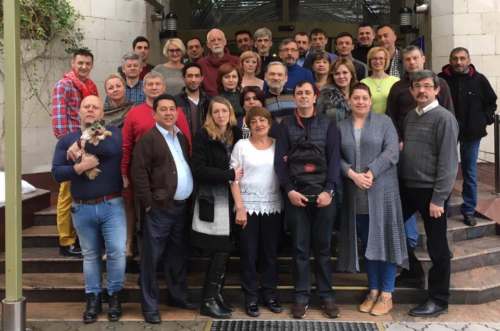In Chisinau, at the annual coordination meeting of the Participants of the General Meeting of the ECUO, the priorities for advocacy activities for the coming year were identified.
 The ECUO participants and focal points from 15 countries of the Eastern Europe and Central Asia, as well as members of the Secretariat of the Organization, gathered in Moldova to summarize the results of the advocacy year, develop and agree on a uniform action plan for an effective response to the HIV/AIDS epidemic. The core topics of the discussions were the review of the general situation in the countries, the definition of priorities to improve access to HIV treatment and the life quality of PLHIV.
The ECUO participants and focal points from 15 countries of the Eastern Europe and Central Asia, as well as members of the Secretariat of the Organization, gathered in Moldova to summarize the results of the advocacy year, develop and agree on a uniform action plan for an effective response to the HIV/AIDS epidemic. The core topics of the discussions were the review of the general situation in the countries, the definition of priorities to improve access to HIV treatment and the life quality of PLHIV.
It is remarkable that on the first day of the event Michel Kazachkin, the UN Special Envoy for HIV/AIDS in East Europe and Central Asia expressed his support and sent an inspirational message to all participants of the meeting. In his letter, Mr. Michel Kazachkin noted the key role, importance and significant contribution of the ECUO international team in overcoming the HIV/AIDS epidemic in the EECA region.
At the meeting opening, Vladimir Zhovtyak, the president of the ECUO, addressed all participants:
“Today, the EECA region is the only region in the world where the HIV epidemic has not been stopped and continues to grow. A number of factors facilitate it: decrease in economic stability in most countries of the region, increase in the liberalization of the social and cultural norms, a continuous decline in the quality of public health services.
At the same time, we are at the stage of change, as new perspectives are now open. Today we have a choice, which we, unfortunately, did not have before. Recent advances in the development and improvement of the HIV drugs have contributed to the development of innovative medicines of the class of integrase inhibitors of the molecular chain transfer. They significantly exceed the non-modern ARV drugs regarding efficiency, safety, and quality, and, most importantly, they are more competitive in price, and, as a rule, have WHO prequalification.
At this point, the governments of the countries of our region should hear the voice of all PLHIV. ARV drugs should improve the quality of life of PLHIV, contributing to adherence to treatment, and not vice versa.
We need to identify the primary measures to overcome the epidemic in our countries, and the key role in this process: an effective and safe ARV therapy.”
The ECUO participants at the meeting unanimously supported the position of the president and initiated the creation of the position statement regarding the application of European approaches to HIV treatment in Eastern Europe and Central Asia. After all, only by joint coordinated actions, we will stop the HIV/AIDS epidemic.
Following the results of the reports and discussions at the meeting, the team assessed the activities of the ECUO and its president in 2016, determined future advocacy priorities, included new participants to the General Meeting: consortia from Kazakhstan and Ukraine, as well as a representative of the international union “ECUO parents union.”
All participants of the ECUO General Meeting confirmed their readiness for active coordination with all regional associations that carry out advocacy work aimed at improving access to HIV treatment and comorbidities, in particular, hepatitis and TB. A priority was given to the cooperation development aimed at the effective regional partnership and joint search for the most cost-efficient, fair and sustainable solutions to common problems in access to a continuum of services based on regional solidarity, shared responsibility and efforts consolidation.
We should note, the cooperation development with international organizations, donor organizations, in particular, the Global Fund to Fight AIDS, Tuberculosis and Malaria, UN family structures, especially UNICEF, UNAIDS, UNDP and governments of all countries of the EECA region, remain one of the core ECUO priorities.
All ECUO advocacy activities are aimed at ensuring that by 2020, PLHIV receives full access to the HIV care continuum at 100% budget cost in the countries of the EECA region.
24.04.2017
